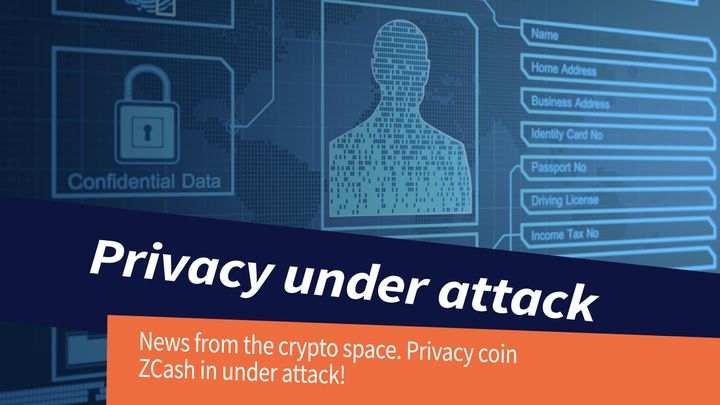With increasing surveillance is it possible to achieve digital anonymity?
Today the world has ever-increasing surveillance. Preserving digital anonymity must be a primary concern.
This article will examine the importance of having anonymity online and the challenges and obstacles preventing this. We will look at the role of cryptocurrency and other communication tools that try to protect and preserve anonymity.
Challenges We Face:
There are a large number of challenges to overcome to maintain anonymity online. Activities are constantly monitored or tracked, data is being exploited or hacked. Whether the challenge comes from government surveillance, corporations collecting data, or cyber-attacks, people face a huge threat daily to their privacy.
Below is a list of constant threats to anonymity:
- Government Surveillance:
There has been increased investment in surveillance technology and this often comes with the tagline 'It's in the interest of national security'. The seemingly open collaboration between governments and tech companies is worrying in so far as retention of data, spying, and how this can be seen as an invasion of privacy. Laws have been getting up to speed with combatting this but have they gone far enough? In Europe, we have the General Data Protection Regulation (GDPR) which offers some protection. A direct quote and meaning of this is:
'GDPR stands for General Data Protection Legislation. It is a European Union (EU) law that came into effect on 25th May 2018. GDPR governs how we can use, process, and store personal data (information about an identifiable, living person).'
Retaining anonymity and protecting oneself when governments continue to implement more and more tracking online is a serious threat to privacy. You could imagine a scenario where you were tracked online buying certain illicit substances, whether you made the purchase is unclear or received the substances but maybe this will be stored in a government database that person X from IP address X is linked with bringing illicit substances into the country. You can also see the reason why this may be seen in the national interest as you want to know that the government can capture anyone who may be bringing something into the country to harm its citizens.
- Corporations Harvesting Data:
Directly targeting people with advertisements based on their searches or what they uploaded to social media platforms or even going as far as collecting information from the microphone on your phone or home devices. For example one day you might have your Instagram app open and start mentioning 'I'd love to buy a new car', and all of a sudden you are bombarded across different platforms with advertisements offering new cars. You can't use your phone or computer without constant reminders about new cars and eventually the corporation has you dreaming about new cars before you finally succumb and end up buying one as it's firmly implanted in your head like the corporation has a vice-like grip on your soul.
- Theft of Identity and Cybercrime:
Sharing your personal information online can be a huge challenge. Whether it be ransomware attacks or theft of identity it is difficult to protect. If you want to buy something from say a coffee shop online, you have to provide your name, email, address, phone number, and payment details. How many different websites will you have to provide the same details over and over again? Do you believe they store that data securely? You take an ever-increasing risk each time.
It was suggested to me that an accountless profile should be possible online. Where one can roam freely and purchase goods with just a public key, if the goods need to be delivered they can be delivered to a Parcel collection facility. Why should I need to provide more info than is necessary?
- Advancements in Technology:
Nowadays facial recognition, biometric data, and advanced tracking methods can be used to identify individuals online and offline. We can only look to China as the leader in this area. Will it lead to a place with a worldwide social credit system and score? Could your data be cloned and mistakenly you are blacklisted as a criminal and can't travel by plane?
- Importance of Awareness and Education:
People need to be more informed about how their data is being used. The tools to protect your data need to be easy to use. Education is key in this area because it still appears that the average user doesn't know what data is being shared, where to check, and where to control sharing.
- Laws:
The laws are different across all countries and continents. What might be protected in Europe may not be protected in the UK or US. How do I know when I travel to another country as an EU citizen that the country I arrive in will not be harvesting my data when I log on from the hotel room?
- Social Engineering:
Attacks where somebody can take on your persona online and ruin your life are becoming more prevalent. Recently I watched 'Can I Tell You A Secret' on Netflix. It is based on the cyberstalking crimes of Matthew Hardy who lived in the UK. For whatever reason he picked random people online and used their data against them to manipulate and ruin their lives.
Link to Netflix:
https://www.netflix.com/ie/title/81637286
- Profiting from Surveillance more commonly known as Surveillance Capitalism:
Users can often trade their personal information for free services without knowing they may be compromising their privacy. This data then may be sold to a corporation or used by someone to try and make profits from individuals.
Freedoms Under Attack:
There are trade-offs due to the convenience of conducting your life online. Yes, it may be more convenient to save your data and accept cookies but understand what your freedom means and what it means if you lose control of this freedom.
I've compiled a list of areas that look to be under attack and what one can do to educate themselves and understand.
- Privacy and your rights:
You should check the laws in your country, you should know what rights you have on the different apps and websites you interact with. You should become familiar with what data is being collected and how to turn on/off what data you are willing to share.
- Freedom to Express Views:
It is becoming increasingly apparent that there is a push to suppress certain voices online and to maybe change the narrative completely. Elon Musk has spoken openly about this and the importance of the freedom of speech. Recently Ireland has tried to enact hate speech laws. What exactly is hate speech? Is it anything that goes against what the government agenda is? Will you be arrested for saying anything that opposes their view?
- Personal Data Control:
Every person should be educated and informed on how to control their data. What you share and how you share it is of the utmost importance.
- Maintaining Anonymity Online:
The Tor Project https://www.torproject.org/ has listened to what the people want and there should be more options to operate anonymously online.
Yes, freedoms are under attack but there are ways to take back those freedoms and not let any corporation or government control your data and possibly your life. The more data they collect the more they can know every aspect of your life and possibly predict how you will think and behave. This could have repercussions when for example voting in elections occurs.

Cryptocurrencies and Financial Freedom:
Cryptocurrencies offer people a solution to financial freedom. You may have heard the phrase 'Not your keys, not your coins'. Such coins as Bitcoin and Decred operate outside of the financial system. Once you maintain a private key or seed phrase you have entire access to your money. This can be spent how and when you choose. No bank can decide to freeze your account or take a percentage fee for 'administration'. This is your money.
Why Cryptocurrency Matters:
The current centralized financial system comes with a lot of vulnerabilities. Your account can be frozen, fees can be taken, and governments can decide to take your hard-earned money as what happened in Greece after the financial collapse in 2008. This is why there is a need for cryptocurrency.
What does it solve:
As society is becoming more cashless there is a need for a replacement. Gold was often seen as an alternative but is also not easily transacted with. The limited supply of coins like Bitcoin and Decred also offers a hedge against inflation. In countries like Turkey where inflation is a constant problem, we can see where Cryptocurrency can address these problems.
Also with Decred, you have governance which makes for a more inclusive environment for your money.
Cryptocurrency Problems and how to solve:
Bitcoin has been the pioneer and the creator and some might say the leader of cryptocurrencies. It does not come without flaws, however. The bloated blockchain, the slowness of transactions, and the high fees earned by miners through PoW. This is where I believe Decred tried to address these concerns and has created a coin that has governance, is adaptable, has opt-in privacy, has its treasury, and doesn't stagnate. It builds and moves forward as members stake their coins in support of the network.
Communication Tools and Safeguarding Freedom of Speech:
Virtual Private Networks (VPNs) can encrypt internet traffic. Numerous messaging systems like Signal, Telegram, or Bison Relay (bisonrelay.org) offer an alternative to common platforms such as Whatsapp.
For example, you could use a VPN to connect to the Tor browser and operate in some form of anonymity. Thinking about a future where decentralized social media platforms are available and messaging also will allow people to say how they feel without worrying they will be charged under some new law.
Future Prospects and the Way Forward:
Balancing one's security and convenience online remains a big challenge. User-friendly solutions should be built that will seamlessly integrate with daily online interactions.
The Legal Side of Things:
The right balance should be struck that allows users to operate online in some form of anonymity and to have an ability of freedom of speech that is protected.
Education:
Users need to be informed of their rights and what they can and cannot say or can or cannot share online. The right to know what data has been collected clearly and how to turn off what you do not wish to share.
Privacy Tools:
There may come a point when tools like VPNs, anonymous messaging, and anonymous browsers may no longer exist. These should be preserved and constantly evolve.
A Personal Perspective and Conclusion:
The quest for anonymity continues. My perspective would be that each individual has a right to privacy online, a right to freedom of speech, and a right to transact with an anonymous digital currency if they so wish.
Steps must be taken to combat government surveillance and corporations harvesting data. Personal liberties must be preserved at all costs.
Control of your finances is one area that should be paramount. We have seen that we cannot trust the current financial system and the worry of holding money in the traditional banks does not come without inherent risks.
When I look ahead I see great opportunities, user-friendly solutions, educated and informed users, and laws that protect users.
To conclude we must accept that not everyone sees digital anonymity as an issue but with more education and knowledge I believe a happy medium is achievable. The commitment must come from the users. Maintaining freedom of speech, transacting, and operating online without worry. We can see this will take a collective effort but my hope through this article is to inform users of the possibility of a future where one can operate online without intrusion from governments or corporations. I hope you have enjoyed reading and I welcome any feedback.






Comments ()